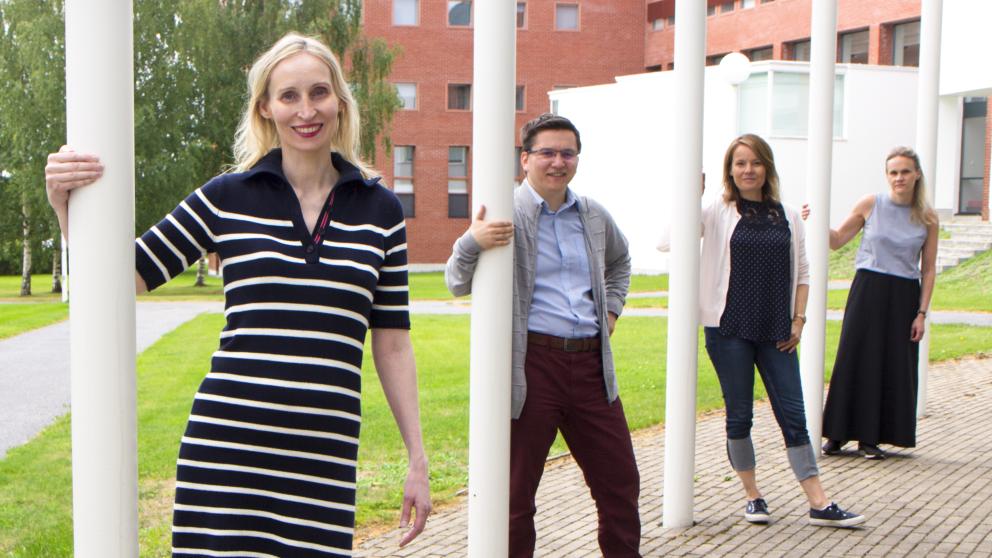More effective support for innovation – ELVIS explores new ways to evaluate the impact of innovation policy

The new ELVIS project of the University of Vaasa intends to respond to this by studying the current state and new trends of impact evaluation and by developing comprehensive approaches and indicators for evaluating the impact of innovation policy. The two-year project is funded by Business Finland. The responsible director of the project is Jari Kuusisto, Rector of the University of Vaasa, and Leena Kunttu is the project manager. In addition, the project's researchers are Helka Kalliomäki, Associate Professor of Innovation Policy, and Researcher Sorin Dan.
– The environment for innovation has changed. The ways in which innovations emerge have changed, and so have the actors. Innovation policy measures now focus relatively broadly on ecosystems and clusters. However, the tools for evaluating impact are designed for a simpler environment and simpler measures, Kuusisto says.
Society supports RDI activities in both the private and public sectors with significant amounts of money each year. The support is estimated to increase national competitiveness, growth and thus general well-being.
– The impact of funding means how the distributed grants and other policy measures produce results in the emergence and commercialisation of innovations, says Leena Kunttu.
Innovation policy measures are not just funding, but a wide range of different policies, programmes and initiatives designed to support the creation and diffusion of various innovations, i.e. new products, processes and services. The ultimate aim of the policy is well-being.
– The effects of innovation policy are also diverse and target both the short and the long term. Current innovation policy evaluation tools reach the multidimensional nature of impact poorly. For this reason, experimental and creative research is needed to broaden and challenge the debate on innovation policy and its evaluation, says Kuusisto.
New impetus for evaluation from international trends
According to Kuusisto and Kunttu, the theme will be broadened by international comparative research, which will help to catch budding perspectives, opportunities and blind spots.
The project will carry out four new case studies on innovation policy and impact evaluation. Top international researchers in the field collaborate in these with the researchers of the project.
The case studies include the methods for impact evaluation of the American National Science Foundation, the Danish Novo Nordisk Foundation, the Swedish Tillväxtanalys, and the development of policy measures to support free innovation, based on research by Professor Jason Potts of RMIT University Melbourne and Professor Eric von Hippel of MIT Sloan School of Management.
– The project will create new knowledge, methods and concepts for reforming the field. Based on the collected research data, policy initiatives and other proposals will be made that would in the future affect the development of Finnish RDI policy and the evaluation of its impact, for example with the help of new indicators. Beneficiaries in Finland will be those who outline RDI policy and research financiers, such as Business Finland and the Academy of Finland, say Kuusisto and Kunttu.
International cooperation networks
ELVIS is a project of the InnoLab research platform focused on entrepreneurship and innovation at the University of Vaasa. According to Mari K. Niemi, Director of InnoLab, the project fits very well with the themes of the research platform and brings valuable new networks.
– InnoLab research platform focuses on open innovations, user innovations, entrepreneurship, and public sector innovation and renewal.
In addition to Professors Hippel and Potts, the project will collaborate with Dr. Peter Svensson (Swedish Agency for Growth Policy Analysis), Director, Dr. Thomas Aslev Christensen (Novo Nordisk Foundation) and Associate Professor Thomas Woodson (Stony Brook University). The networks with international researchers have emerged during Rector Kuusisto's career as a researcher in innovation policy.
– Even as Rector, I want to stay up-to-date in research and understand the everyday life of the researcher, says Rector Kuusisto.
FACTS
ELVIS - Evolving innovation space, RDI policies and impact evaluation
Duration: 1.9.2020–31.8.2022
Funding from: Business Finland and University of Vaasa
Total budget: EUR 317,419
External funding: EUR 301,540
Further information
Jari Kuusisto, Rector, University of Vaasa, tel. +358 29 449 8291, jari.kuusisto (at) uwasa.fi
Leena Kunttu, Project Manager, tel. +358 29 449 8562 leena.kunttu (at) uwasa.fi